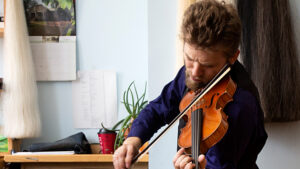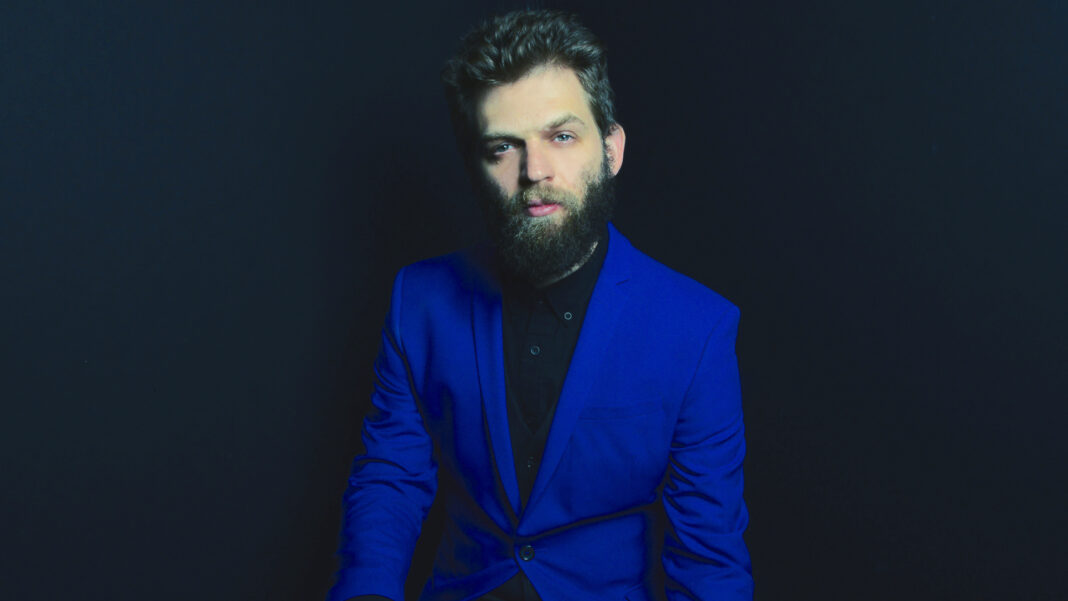
“I do like the possibility of just people experiencing something that they’re unfamiliar with. And then hopefully what it does is just either raises some questions or just piques their curiosity.” That’s how Grammy Award-winning violinist Johnny Gandelsman describes the optimal reaction he’d like audiences have to his new anthology, This Is America.
The project finds Gandelsman performing 24 newly-commissioned works for solo violin. Amongst the composers who have contributed to This Is America are Rhiannon Giddens, Angélica Negrón, Tomeka Reid, Terry Reily, Tyshawn Sorey and Conrad Tao. The composers represent the true melting pot that is America: straight, gay, multiple ethnicities, young, old, immigrants and more.
Gandelsman is himself an immigrant having been born in Russia. He was raised there and in Israel before moving to the United States. He is best known as the co-founder of the string quartet Brooklyn Rider and a regular collaborator with Silkroad Ensemble. Gandelsman has collaborated with such artists as David Byrne, Yo-Yo Ma, Anne Sofie von Otter and Suzanne Vega.
Our conversation took place after a horrific weekend of violence and racism in the country he now calls home. What follows are excerpts from that conversation that have been edited for length and clarity.
How much is your list of composers for This Is America a reflection of that basic idea of what this country is supposed to be and by extension, how much does their individual music represent that concept as well?
The project is there to sort of broaden the conversation about what is America and who are the voices that we hear from in the concert hall. So all of those things where definitely part of my thinking when I was working on the list. I love lists. I have a very long list of people that I would love to work with. So 24 is definitely not the end of it. It’s trying to present a broad view of what’s happening right now in this country in terms of creative output. This is just a drop in the bucket.
How does new music allow you to do that in a way that the classic repertoire of classical music does not?
If we want people to feel connected to music, to what we do on stage, we can’t just play the old stuff. It just doesn’t make any sense. I really think that hearing from people who are writing music today and putting their experience in front of other people is the way for audiences to connect to music that’s written right now. Just like people [could] connect it to when Beethoven was writing his symphonies and he was a contemporary composer. I think the practice of playing music of the past is a relatively new idea. And while it has done some good things in terms of making sure that those pieces are around and people are familiar with them, it just cannot be the only thing that our art form does.
Each composer has his or her own approach and compositional style. How did you respond to all these various pieces?
Some pieces I had a feeling that I understood right away. And some pieces what was being asked of me was was either foreign to me or challenging or just something that I’ve never tried before. And so I had to overcome this sense of fear of I can’t do that. That’s foreign. That’s no good. It’s embarrassing to admit, but my first reaction was, oh, this is just not good, you know? And it was just because I didn’t understand it. And I was totally afraid of it. What was really nice about it was that the composers were really kind and gently guided me into their process of thinking and what they were imagining.

That fear or the unknown seems like it is also a reflection of our world today.
When faced with something that was really challenging, my first reaction was fear. And that’s what we see in the world today across all all spheres of of our lives. People, when faced with unknown things, the first reaction often is rejection of those things. I say this in the notes for the album, but I really wish that people in all walks of life would have this kind of gentle guidance into the unfamiliar world where they could feel safe to experience something new and then find a way to accept people who [have] different ideas, who are different.
Once you settled into each composition in This Is America, how has your approach to them grown? In addition to the recording you are also performing some of the selections live in concert.
When I recorded these pieces they were very fresh. Since then I’ve had a chance to perform them. That experience in itself changes how I feel about it. It changes the piece. In a way I wish I could re-record the whole thing again. But that’s true of almost all albums that are made. I do think that the pieces might resonate now slightly differently. I mean the world just keeps throwing these things at us that are just constant.
Has This is America allowed you to foster a greater love for America or question whether the American experiment is destined to ultimately fail?
That’s a really hard question. I love this place. I’m Russian, Israeli, American. And all of these places have some incredibly disturbing things about them. At the same time they have great culture, great people and probably equal amount of people who believe in the things that we believe in. They just don’t have the governments that, at least currently, allow for a conversation about that really. So I don’t know. I do believe that this place the idea is great, but it’s clearly a work in progress.
It’s easy to kind of stay in your own bubble and not engage. It seems like maybe we don’t have the luxury of staying on the sidelines and letting it roll down the hill and then seeing what happens. I think people do whatever they believe they need to do in their own ways. I can’t say that I’m an activist in any way. I’m hoping that through the work of being a musician there’s something positive that I can bring to the conversation or people’s experience.
Hopefully for at least the length of your concert, regardless of ideologies, people are having a shared experience that silences those differences.
This might be my imagination, but it does feel like when we’re together in the room experiencing music – and that’s relatively new now right after COVID – people find ways to connect to, if not the music, but the idea behind it. I think that’s a kind of invisible bridge that is established for that period of time. So it does feel like we’re all in it together: the composers, the audience and myself. Which is a nice place to be.
Johnny Gandelsman will perform selections from This Is America at The Wallis in Beverly Hills on May 19th. For tickets and more information, please go here.
To pre-order the CD or a digital download of “This Is America,” please go here.
All photos courtesy of the artist and The Wallis.










